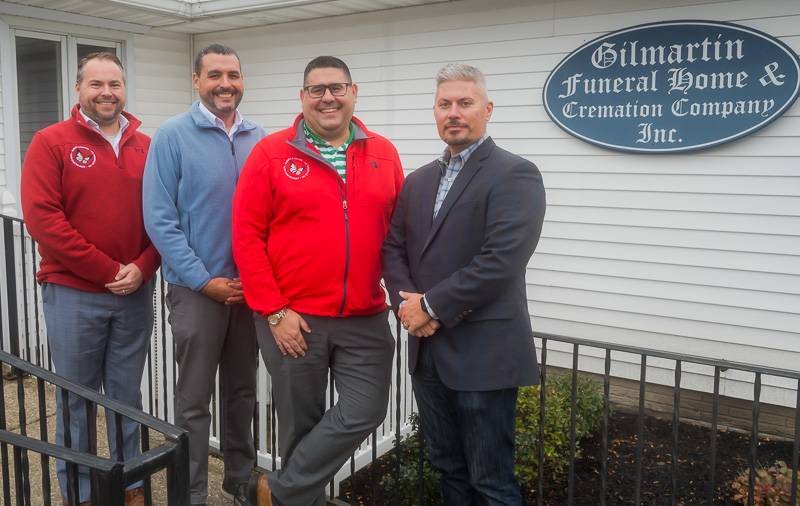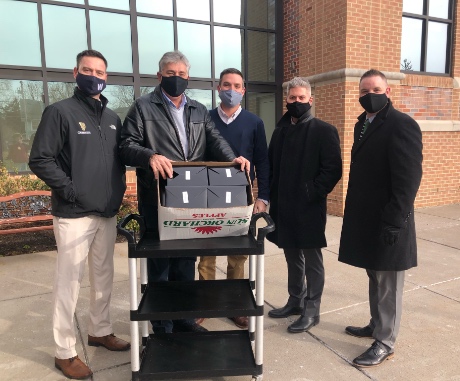A friendly merger: H.E. Turner and Gilmartin sign deal

Photo by Howard Owens
For two longstanding, reputable businesses, even though they had been competitors, their futures were heading toward an intersection that both sides eventually knew was coming.
Business trends, staffing needs, customer spending habits and the pandemic all played a role in merging their paths.
“The big thing is that Gilmartin, and Marley's, and Eaton Watson have always had a stellar reputation in the communities that they serve. And we felt as if we did, too, or do, and from all parties’ standpoint, it seemed to make sense. The funeral business is not unlike any other industry. We're facing just immense staffing problems. And our staff are harder to come by because you have to be licensed. And that's not an easy process for folks.
And both of us recognized… that a staffing problem was imminent, and so that, coupled with the changing societal views of funeral services — people going more towards cremation and less towards casket burial — it just started to make sense that each side needed to do something in order to remain,” Steven Johnson said in an interview with The Batavian about H.E. Turner’s deal to buy Gilmartin Funeral Home & Cremation Company Inc.
It wasn’t about a risk of going out of business, he said, “because that is certainly not the case.” But, rather, it was a desire of both Batavia-based businesses to “secure the legacies of all of our founders well into the future,” he said.
Turner, the oldest continuously operator-owned business in Genesee County, Johnson said, was founded in January 1910. Owners Johnson, Justin Calarco-Smith and Joshua Smith and Gilmartin owner T.J. Woodward completed the deal on Aug. 14, although perhaps no one’s the wiser because not much on the surface is changing, aside from some managerial details.
Timothy “T.J.” Woodward, owner of Gilmartin at 329 West Main St., Batavia, said it was still a bit raw to talk about, as it was “a very, very difficult decision” to make.
“It was a super emotional decision. My grandpa started the funeral home,” he said.
His grandfather, the late Darwin Gilmartin, founded the home in 1955. Timothy D. Woodward, T.J.’s dad, bought the business in 1986, and T.J., in turn, purchased it in 2011, which is when he also bought Eaton-Watson from his dad. The third-generation funeral director purchased Marley Funeral Home in Attica two years later.
He began in the business at 19, and it has been the majority of his life. This decision seems about “10 to 15 years earlier than I had wanted,” he said.
“But I think it was inevitable one way or another, I think that they were either going to buy me out, or I was gonna buy them out at some point. So I think it was inevitable,” Woodward said. “I looked at the opportunity that I had in front of me and thought that it was best for myself and my family. And that's the direction I decided to go.”
Customers have been informed, and all of the prior licensed funeral directors will remain in place, including Turner’s other acquisitions of Marley Funeral Home and Eaton-Watson. That means that T.J. Woodward will still be at Gilmartin, Tom Bush will remain at Eaton-Watson and Zachary Curtis, a funeral director at Turner, will be managing the day-to-day operations of Marley and “taking that off T.J.’s plate,” Johnson said.
“We’re looking at this as a merger and sharing key staff. Each funeral home has to be managed by a different director. We have eight full-time licensed funeral directors. So I think what the public should know is that the service and the attention to detail that they have come to expect from each of the respective firms will not change. All of the people that they know and have come to trust and have friendships with throughout the years are still here,” Johnson said. “The only things that are changing are some sharing of staff. And some behind-the-scenes managerial things that no one would ever know about if we didn't say anything.
“So, we're not jacking prices, we're not playing any games, we're gonna continue to do things the way that we have always done them,” he said. “Both firms have enjoyed an extremely good reputation locally, in the Greater Western New York area, and in the state. We're active in the state and the national associations. T.J., Justin, Josh, Zach and I are not going anywhere.”
Turner also employs three part-time licensed funeral directors and has one state-registered resident intern pursuing a license, plus unlicensed staff that assists with directing funerals, taking first calls, and performing housekeeping and maintenance duties.
Turner owns all of the eight properties, and the company, though a competitor with Gilmartin for decades, has always been on friendly terms, Johnson said. There just came a point about a year ago when both funeral home owners began to discuss options about Turner purchasing all three of Gilmartin’s funeral homes, Johnson and Woodward said.
Johnson stepped into the business in January 2011 and has been a part-owner since 2020, with an accumulated 20 years in the funeral business. One factor that really played a role in changing the industry was the pandemic shutdown and social distancing requirements, he said.
“I think there's always going to be people who want to bury, and I think there's always going to be people who want to cremate. But I don't ever see it going back closer to 50/50 like it was. We're closer to 65 percent cremation right now. And honestly, COVID very much exacerbated that. I mean, it dramatically increased after COVID. A huge part of that was that people couldn't have services,” Johnson said. “I do think that people still see a value in having a funeral or a celebration of life of some sort. I think that people still see value in viewing their loved ones. I do see the business changing or continuing to adapt or evolve.
'Funerals are not something that funeral directors invented as a way to make money. People want to have funerals. I mean, what we're looking for is for somebody to stand in the front of our family and friends and say something nice about the person that died. That's all we're looking for. And, you know, that's what we do. We facilitate that. And no matter what happens, the grief process doesn't end; it doesn't change. There's no way around it. The only way to get through grief is to go through it. And a funeral director’s job, truthfully, is to help facilitate healthy grief by having viewings and funerals, and ceremony of some sort.”
He wants to assure those folks who have prepaid with any of the funeral homes that all of it remains safe and secure. “We are honoring any pre-arrangement,” he said.
A little H.E. Turner history
This story, according to the company's website, begins in January of 1910, when Harry Ernest Turner, a native of Clarendon, and Harry D. Bartlett of Holley bought the Williamson Furniture and Undertaking Store.
The furniture and funeral combination wasn’t unusual at the time. Historians believe early furniture stores carried coffins and other funeral accessories, which made them a natural link to the funeral business.
Turner, who worked ten years in a furniture store in Holley before purchasing the Batavia store, published a weekly newspaper, The Holley Standard, as a sideline. Bartlett served as Orleans County Clerk in the early 1900s, and the pair also had a joint interest in stores in Byron and Holley, which they sold a few years after they came to Batavia.
H.E. Turner & Co. was operated at 111 Main St., the former Newberry Building, until 1921, when it was moved to the Cary Mansion at 211 East Main St. Fourteen years later, the firm moved to the Bean Mansion at 403 East Main St., where it remains today.
Harry Turner served as president until his death on January 30, 1949, when James B. McCulley and Harold J. Bishop took over. The furniture line was gone by the time Bishop assumed sole ownership of the business following McCulley’s death in 1953.
Bishop continued the business with the help of new associates, Harold Kruger and Edward Canty, for a dozen years preceding his own death in 1965, at which time Canty became president of the funeral home. He and Kruger carried on the Turner tradition with the help of Amos Grefrath and George Patterson.
Mr. Canty retired in 1972, at which time Patterson took over as president. Kruger retired in 1975. Patterson died in December of 1976, and management became the responsibility of James F. Smith, Amos Grefrath and Ed Canty’s nephew, James Canty.
Jim Smith worked at the former C.W. Bohm Mortuary before he came to Turner’s. He became president of the firm in 1977.
As the business grew, so did Smith’s desire to continue the Turner tradition of fine service to the community. He opened the funeral home in Bergen in July of 1988.
Amos retired in 1986. Jim Canty retired in 1992, leaving Jim Smith the sole owner of the funeral home.
In October 2012, Mr. Smith transferred ownership of the firm to his two sons, Justin D. Calarco-Smith, and Joshua J. Smith, along with his longtime trusted friend and employee, Randy W. McIntire. Jim Smith died on Aug. 9, 2023.
In April of 2020, Randy W. McIntire transferred his interest in the firm to Steven L. Johnson, who has been with the firm since January 2011. Together the staff has more than 115 years of funeral service experience.
Marley Funeral Home was founded in 1921 by Ervin J. Marley as E.J. Marley Furniture & Undertaking. In 1949 Richard O. Merle and his wife, Alice, purchased the firm. David M. Sokol began working there in 1973 and together with his wife, Beth they purchased the firm in 1991. Dave sold to Gilmartin Funeral Home in 2012.
Eaton-Watson Funeral Home was founded on Lake Street in Perry by Stan Eaton prior to WW II. The firm was sold to Russ Watson in the 1950s, followed by Kathy Miller in the early to mid 1990s, who moved the firm to its North Main Street location in 1999. She sold the firm to Gilmartin Funeral Home in 2007. Tom Bush has been a funeral director at that funeral home since 2002 and the Managing Funeral Director since 2007.
Turner also owns Robinson and Hackemer Funeral Home in Warsaw, which it purchased three years ago.

